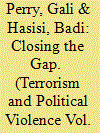|
|
|
Sort Order |
|
|
|
Items / Page
|
|
|
|
|
|
|
| Srl | Item |
| 1 |
ID:
080805


|
|
|
|
|
| Publication |
2008.
|
| Summary/Abstract |
This article deals with patterns of consumption and of advertisement, as a field for the analysis of two major processes in the Palestinian society of Mandate Palestine: the growth of an urban middle class and the consolidation of the Palestinian national movement. The advertisements, sampled from the popular daily paper Filastin, analysed in the context of political and economic events, highlight the complex interplay between nationalism and class formation, and the contradictory tensions between the two processes. A smaller sampling in al-Difa' points to similar, though not identical, trends. This analysis also highlights new dimensions of the Jewish-Arab conflict by drawing attention to the semi-private sphere of consumption which appears to have been less segregated than the more often studied political and economic spheres
|
|
|
|
|
|
|
|
|
|
|
|
|
|
|
|
| 2 |
ID:
175714


|
|
|
|
|
| Summary/Abstract |
In the aftermath of 9/11, aviation security has become a central component of counterterrorism. To mitigate threats whilst maintaining flight schedules, airport security officers require the cooperation of all passengers, but especially of ethnic minorities perceived as posing a potential threat to homeland security, often referred to as “suspect communities.” Passengers from suspect communities are subject to rigorous screening, but are also regarded as a source of information, making their cooperation even more important than that of other passengers. Nevertheless, suspect communities’ cooperation with airport security, and the gap between their attitudes and those of other passengers, have not yet been examined. The current study utilizes a survey of 1970 passengers at the Ben-Gurion airport in Israel, examining passengers’ perceptions of airport security and their willingness to cooperate. We find that passengers belonging to the suspect community of Israeli Muslims were less willing to cooperate with security procedures than all other passengers. However, when controlling for passengers’ perceptions of legitimacy and procedural justice, Israeli Muslims were more willing to cooperate with airport security than Israeli Jews. The findings highlight the importance of legitimacy and procedural justice perceptions in obtaining the cooperation of suspect communities, and suggest practical pathways for improving cooperation.
|
|
|
|
|
|
|
|
|
|
|
|
|
|
|
|
| 3 |
ID:
165739


|
|
|
|
|
| Summary/Abstract |
This article deals with the manner in which family and community in Mandate Palestine attempted to keep the criminal justice system from intervening in cases defined as ‘Family Honour Killing’. Drawing on criminal court cases, we argue that the familial, domestic and communal features of this crime and its social, predominantly rural, context were critical for the attempts to keep it within the community and to prevent state intervention by obstructing, concealing and denying evidence. We focus on the mechanisms used by members of the family and community for that purpose. Our case study is in line with previous findings indicating the under-reporting of domestic violence, especially when witnesses were closely related to both the victim and the perpetrator. This domestic and communal alignment was most likely reinforced under colonial rule, though it was not necessarily caused predominantly in opposition to it.
|
|
|
|
|
|
|
|
|
|
|
|
|
|
|
|
| 4 |
ID:
138775


|
|
|
|
|
| Summary/Abstract |
Suicide terrorism is the most violent and horrifying form of terrorism in the world today. This kind of terrorism causes many fatalities and can throw an entire nation into a state of panic. We usually attribute this kind of terrorism to altruistic motivation, assuming that bombers are willing to sacrifice themselves for a higher cause. The current study uses the criminological theory of Rational Choice to analyze the motivation of jihadist suicide terrorism. By reviewing the religious, personal, and social incentives, we demonstrate that even those who kill themselves in suicide attacks, which are seemingly examples of irrational or altruistic behavior, do so while considering future, self-gratifying benefits. Since this self-destructive behavior is mostly driven not by altruistic motivation but by the anticipation of costs and benefits, we find that there is no fundamental difference between the perpetrators’ motivations and those of other criminals; both groups are committed to maximizing self-gratifying, beneficial behavior.
|
|
|
|
|
|
|
|
|
|
|
|
|
|
|
|
|
|
|
|
|